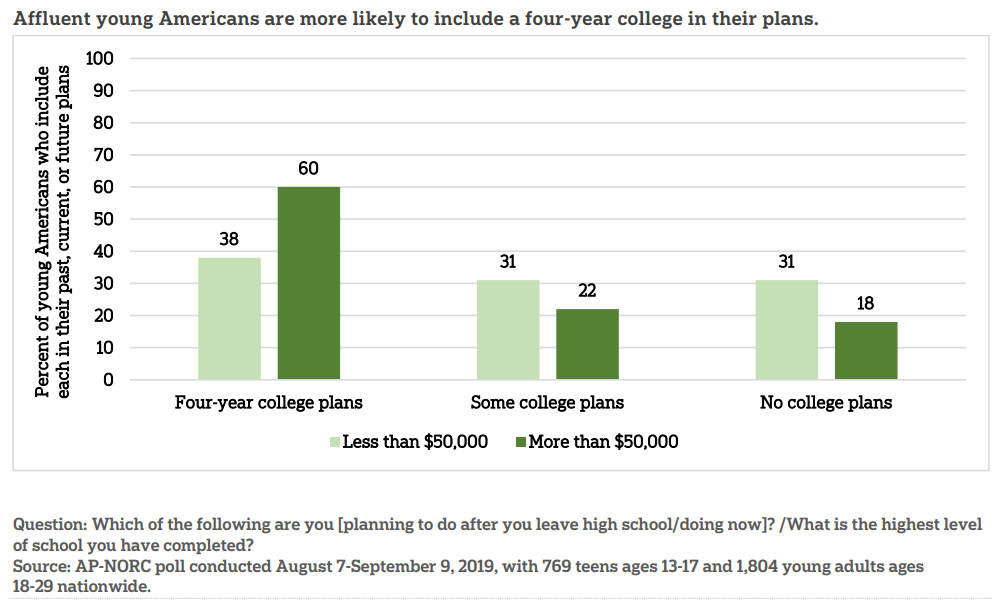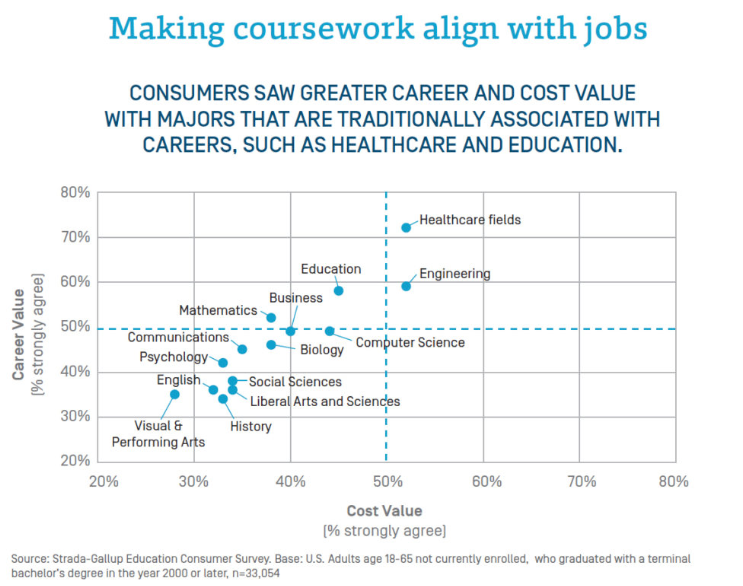Commentary
I reflect on the fact that November was a relatively quiet month for new research to be released, and December is the opposite. Lots of interesting stuff is going on in the higher education research workspace by contributors such as the Federal Reserve
Bank of Philadelphia, the National Bureau of Economic Research, the National Student Clearinghouse, the U.S. Department of Education and others. The AACRAO Research to-do list is also filled for the next couple of months with a variety of topics,
from the 2020 CEMO career profile survey and potential student-based excess credits at graduation research to change management practices and transfer technology. All of which is aimed at providing you with the data you need for work or just to satisfy
your own curiosity. Please don’t hesitate to send me your practice-based research ideas.
I stumbled across an opinion piece in the Cornell Daily Sun written by a senior and student advisor that really resonated with
me in relation to the push to get students to declare and stay with a major early in their academic careers. I have been chatting off and on with colleagues for a few years now about the value of exploratory courses for fun or the undecided and/or
changing majors if a student finds him or herself on a degree path that is not a match. This tactic is in contrast with the more lock step approaches popular right now of starting with a major early on and sticking with it to complete on-time and
with no extraneous credits. This opinion piece is one student’s story about a double major where he “endures” one and gets excited to register for courses in the other and the reasons why he is sticking with the first. One of our
potential research projects would explore this topic further.
Happy Holidays, Wendy
AACRAO Research Update
The following projects are in the works for AACRAO Research:
- The January 2020 60-Second Survey will ask all members about their experience with enrollment management and their interest, or lack of, in enrollment management related research.
- A comprehensive survey on institutional change management practices and individual experiences will be shared with AACRAO primary contacts in January. This survey is incentivized and designed, in part, to help AACRAO define professional development
needs around the change management core competency.
- The chief enrollment management officer career profile survey will be deployed in early spring.
- We will be seeking four-year institutional partners to anonymously survey their undergraduate spring completers about excess credits and graduation and transfer. This project is designed to be an expansion on the research conducted at a single institution
and included in the upcoming SEMQ article “Excess Credit Accumulation: An Examination of Contributing Factors for First-time Bachelor’s Degree Earners.”
- An AACRAO Research year in review article for 2019 is being compiled for release in the spring 2020 C&U.
- We are producing a primer on transfer technology for the soon-to-be-formed ACE transfer working group.
- Excerpts from the WICHE/Lumina project report on prior learning assessment (PLA) will be released as part of the AACRAO Academic Record and Transcript Guide in early 2020. The complete AACRAO PLA practices report will be released on the AACRAO
website in February and by WICHE at around the same time as part of a comprehensive report on the subject.
- The report on the just-completed PLA experiences student survey will be drafted in the next month and will also be released as part of the institutional practices report.
Current Higher Education Research and Related Topics
Job Experience Favored Over College by Many Young Adults and Teens
A new article from the Associated Press-NORC Center for Public Affairs examines the attitudes of young adults and teens
toward the value and cost of higher education. While most still value higher education, the survey paints a complex picture of their views on it. Key points include:
- 48% percent of people surveyed plan to attend, are currently attending, or have attended a four-year college. Only 27% say the same about community college, vocational school or trade school.
- The likeliness to attend a four-year college is strongly correlated with household income, with 73% of respondents with household incomes over $100,000 likely to attend, compared to only 38% of respondents with household incomes below $50,000.
- More affluent respondents are more likely to receive help from their parents in paying for college tuition, filling out financial aid forms and researching college options.
- 67% of respondents who attended or plan to attend a four-year college have taken, or plan to take, out a loan.

Source: NORC Center for Public Affairs
New Report Examines The Demographics of Those Taking and Completing Microcredentials
A new report from Teachers College of Columbia University examines who is taking and completing microcredential
courses, and their benefits. The study examined MIT’s Micromasters and other specialization courses:
- Participants are likely white or Asian, well educated, employed and 30 to 44 years old.
- Completers are very similar in their demographics, with the average age being 36.
- 85% of completers had a bachelor’s degree, and almost half had a graduate degree.
- Just 6% of respondents said that the program helped them get a pay raise, and only 10% said completion improved an application to a new job.
First-Year Earnings Data for College Programs Released
The U.S. Department of Education has released data on the initial earnings of college graduates after graduation. The data is available by field of study for the first time and is integrated into the Education Department’s College Scorecard.
To find earnings data by program, navigate to an institution’s page in the Scorecard, and scroll down to “Salary After Completing by Field of Study.”
New Study Examines the Effectiveness of Corequisite Remediation
A new working paper published by the Community College Research Center examines the effects of corequisite remediation
at 13 community colleges in Tennessee. The authors found the following:
- Those students who were nearly college-ready placed into corequisite remediation were 15% more likely to pass a “gateway” math course, compared to students who took prerequisite remediation.
- Those students were also 13% more likely to pass a “gateway” English course, compared to those who took a prerequisite course.
- Compared to students placed into college-level courses, students placed into corequisite remediation had similar “gateway” course completion rates.
- Students placed into corequisite remediation were 8% more likely to pass a subsequent college-level math course after completing a “gateway” math course.
- The authors found no significant impacts on enrollment persistence, transfer to a four-year college or degree completion.
Report Ranks Colleges and Universities by Return on Investment
The report from Georgetown University, entitled “A First Try at ROI: Ranking 4,500 Colleges” used data from the expanded College Scorecard. Data for individual institutions
can be viewed. Additional findings include:
- Bachelor’s degrees from private colleges generally have higher return on investment than those from public colleges, as measured 40 years after enrollment.
- Community colleges and many certificate programs have the highest short-term returns, as measured 10 years after enrollment.
- Returns from bachelor’s degrees surpass those of most two-year credentials over time.
New Survey Asks Consumers About What They Value in Higher Education
Strada Education Network and Gallup asked more than 340,000 people about their experiences in higher education and work. The report clearly shows that relevance of education, rather than post-completion earning, is most important to consumers. Key findings include:
- Bachelor's degree graduates saw greater career and cost value in career-focused fields such as healthcare and education.
- Those respondents who started postsecondary education but did not complete saw the least value from their experience.
- Respondents who believed they were provided applied learning experiences, quality instruction and academic advising assessed the value of their education.

An Older Sibling in College Affects the Admissions of Younger Siblings
A working paper[1] from the National Bureau of Economic Research finds that an older sibling going to college has a substantial influence on younger siblings. The impact of this influence is strongest on those younger siblings uncertain
whether to attend college. In addition, the authors found:
- Older siblings’ admission to college substantially increased younger siblings’ four-year college enrollment rate and quality of institution attended
- Older siblings enrollment at college nearly quadruples the probability that younger siblings apply to the same target college
- Younger siblings nearly double their probability of applying only to higher quality colleges (measured by graduation rate)
Income Share Agreements to Fund Post-Secondary Education
The Federal Reserve Bank of Philadelphia released a discussion paper on the current
state of income share agreements (ISAs) as a means for students to fund postsecondary credentials. An ISA is a contract that enables a student to pay future income over time to cover postsecondary education today. The authors examine the current state
of the marketplace, how institutions consider offering ISAs to students, the theoretical costs and benefits and, finally, the challenges to offering ISAs.
Virtual Advising and College Enrollment
Researchers at UCLA conducted a field experiment and found[2] no evidence that access to 15 months of virtual college-counseling aimed at reducing informational and social barriers to the college enrollment process had an impact. The 6,500 students who participated were predominantly female, low-income,
second-generation immigrants, and about 50% Hispanic. Students in the group assigned to receive the counseling reported feeling more supported but were not more likely to be accepted or enroll at four-year institutions. The exception within
the sample were Hispanic students who did, in fact, enroll at a higher rate than non-participants.
National Student Clearinghouse Report on 8-Year Completion Rates
In case you missed it, here is a link to the latest completion report by the National Student Clearinghouse. Data indicates that the eight-year college completion
rate has reached 62%.
Bottom Line College Advising Model a Success
The Institute of Education Sciences (IES) What Works Clearninghouse (WWC) reviewed the impact of the Bottom Line college advising program and found statistically significant positive effects on four-year college enrollment for students who participated in the program. The program consists of two parts. The first, BL Access, targeting high school juniors and seniors and the second, BL Success, which provides advising for students who attend
a participating college.
[1] Access to the full report requires a subscription, purchase or access through a college or university.
[2] Access to the full report requires a subscription, purchase or access through a college or university.